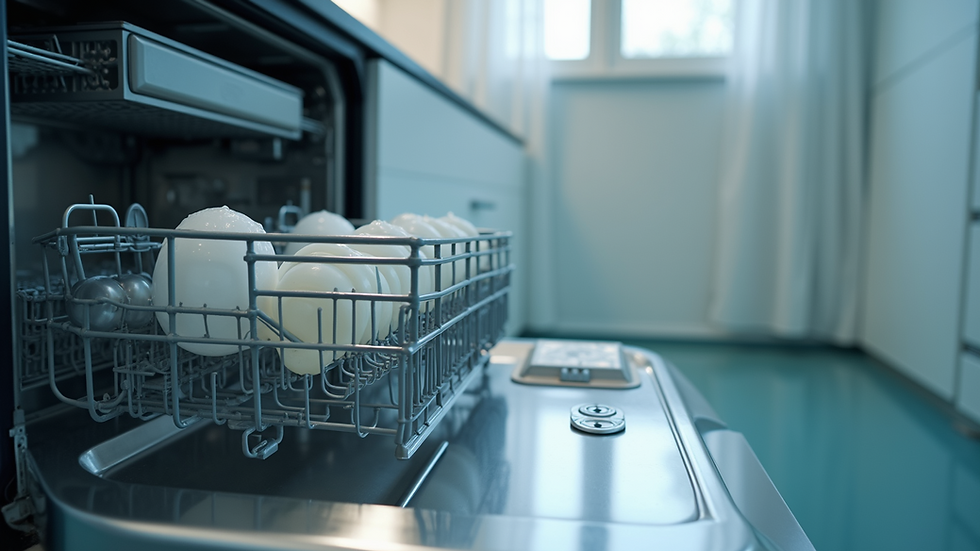When to Call for Appliance Maintenance Help
- abbottappliance
- Jul 28, 2025
- 4 min read
Home appliances make life easier and more comfortable. From refrigerators keeping food fresh to washing machines cleaning clothes, these devices are essential. However, like any machine, they can break down or lose efficiency over time. Knowing when to call for appliance maintenance help can save you money, time, and stress. This guide will help you recognize the signs that your appliances need professional attention and how to handle common issues.
Signs You Need Appliance Maintenance
Appliances often give subtle hints before they completely fail. Paying attention to these signs can prevent bigger problems.
Strange Noises or Smells
If your appliance starts making unusual sounds like grinding, buzzing, or rattling, it could indicate worn-out parts or loose components. Similarly, a burning smell or any odd odor coming from an appliance is a red flag. These symptoms suggest electrical issues or overheating, which can be dangerous.
Inconsistent Performance
When your appliance no longer performs as it used to, it might be time for maintenance. For example:
A refrigerator that struggles to keep food cold.
A dishwasher that leaves dishes dirty.
A dryer that takes longer than usual to dry clothes.
These issues often point to clogged filters, worn belts, or failing motors.
Visible Damage or Leaks
Physical damage such as cracks, rust, or water leaks should never be ignored. Leaks can cause water damage to your home and indicate problems with seals or hoses. Rust and cracks can worsen over time, leading to appliance failure.

Frequent Breakdowns
If you find yourself repairing the same appliance repeatedly, it might be more cost-effective to get professional maintenance or consider replacement. Frequent breakdowns can indicate underlying issues that require expert diagnosis.
The Importance of Regular Appliance Maintenance
Regular maintenance extends the life of your appliances and keeps them running efficiently. Here’s why it matters:
Saves Money in the Long Run
Routine checks and tune-ups prevent small problems from becoming costly repairs. For example, cleaning refrigerator coils can reduce energy consumption and prevent compressor failure.
Improves Safety
Faulty appliances can pose safety risks such as electrical shocks or fire hazards. Maintenance ensures all parts are functioning safely.
Enhances Efficiency
Well-maintained appliances use less energy and perform better. This can lower your utility bills and reduce your environmental footprint.
Maintains Warranty Validity
Some appliance warranties require regular maintenance to remain valid. Skipping maintenance might void your warranty, leaving you responsible for repair costs.

How much does it cost for an appliance repairman to come out?
Understanding the cost of calling a professional can help you decide when to seek help.
Typical Service Call Fees
Most appliance repair services charge a service call fee, which covers the technician’s time and travel. This fee usually ranges from $50 to $100 depending on your location and the company.
Repair Costs
After diagnosing the problem, the technician will provide a repair estimate. Common repairs like replacing belts, thermostats, or sensors can cost between $100 and $300. More complex repairs or parts replacement may be higher.
When to Consider Replacement
If repair costs approach or exceed 50% of the appliance’s value, it might be more economical to replace the appliance. A professional can help you weigh this decision.
Tips to Save on Repair Costs
Schedule maintenance before problems worsen.
Ask for a detailed estimate before authorizing repairs.
Use a reputable appliance repair service to avoid unnecessary charges.
DIY Maintenance Tips to Prevent Major Issues
While some repairs require professionals, you can perform simple maintenance tasks to keep appliances in good shape.
Clean Appliance Filters and Coils
Vacuum refrigerator coils every six months.
Clean dryer lint traps after every use.
Remove and wash dishwasher filters monthly.
Check and Replace Seals
Inspect door seals on refrigerators and ovens for cracks or gaps. Replace them if they are damaged to maintain efficiency.
Avoid Overloading
Overloading washing machines or dishwashers strains motors and reduces cleaning effectiveness. Follow manufacturer guidelines for load sizes.
Use Appliances Properly
Avoid using appliances for tasks they are not designed for. For example, do not put heavy pots on glass stovetops or use abrasive cleaners on sensitive surfaces.

When to Call a Professional for Appliance Maintenance Help
Knowing when to call a professional can prevent further damage and ensure safety.
After Noticing Warning Signs
If you observe any of the signs mentioned earlier such as strange noises, leaks, or inconsistent performance, it’s time to call an expert.
For Complex Repairs
Electrical issues, gas appliance repairs, or problems involving internal components should always be handled by trained technicians.
When You Lack Tools or Experience
Attempting repairs without the right tools or knowledge can cause more harm than good. Professionals have the expertise and equipment to fix problems correctly.
For Regular Tune-Ups
Scheduling annual or bi-annual maintenance with a professional can keep your appliances running smoothly and catch issues early.
Taking care of your home appliances through timely maintenance and knowing when to seek professional help can save you money and hassle. Keep an eye out for warning signs, perform simple upkeep, and don’t hesitate to call a trusted appliance repair service when needed. Your appliances will thank you with years of reliable service.








Comments